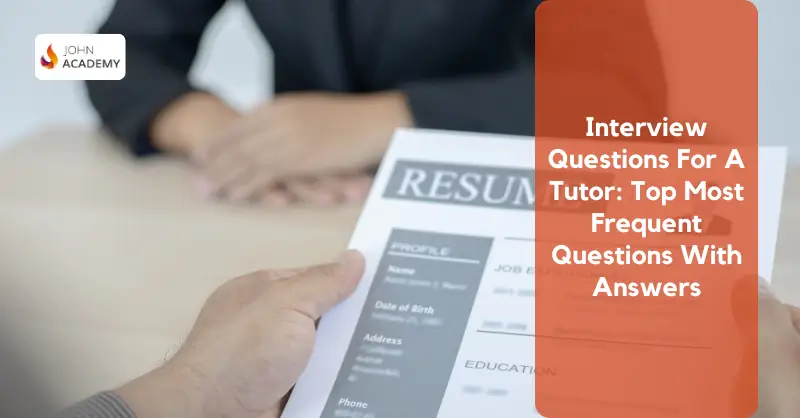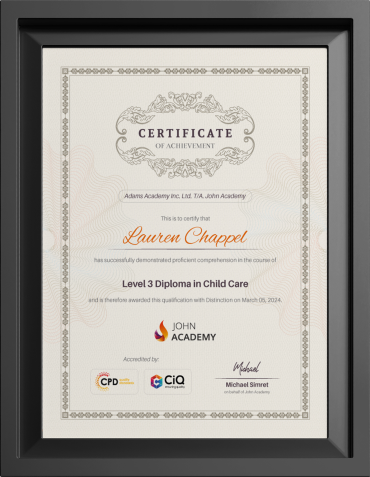
Tutoring candidates are asked a variety of questions during the interview process. These questions are meant to test their teaching theory, experience, and ability to connect and help students properly. These interview questions can be broken down into a few main categories:
Teaching Approach and Methodology
1. Candidates might be asked to explain how they teach and how they change it for different types of students.
2. Questions could be about how to plan lessons, how to get students interested, and how to meet the needs of a wide range of students.
Experience and Adaptability
1. Interviewers often ask about a candidate’s previous positions as teachers, especially when they had to change how they taught in order to help students do better.
2. It’s also possible for candidates to be asked about their ability to help students prepare for standardised tests or do better in certain topics.
Student Interaction and Classroom Management
1. Candidates will be asked how they deal with behaviour problems in the classroom and what methods they use to get students involved.
2. Interviewers could ask about effective tutoring sessions or instances in which the candidate modified their strategy to suit the requirements of a certain student.
3. Also, if you are new to technology and have no experience as a teacher, online platforms are the best option. The best platforms include Ostado, Tutorful, and Superprof.
Category 1: Subject Knowledge Interview Questions for a Tutor
The purpose of subject knowledge interview questions for a teacher is to find out how well the individual knows and understands the areas they will be teaching.
Question 1: Can You Clarify an Idea of a Difficult Topic for a Struggling Student?
Answer:
Of course! Calculus, and especially the basic theorem of calculus, is a difficult idea in math. I would break this idea down into two main ideas, difference and integration, to make it easier for a student who is having trouble with it. First, I’d like to describe what differentiation is.
Differentiation is the process of finding the rate of change of a function at any point, which is similar to finding the slope of a graph. Then, I would talk about integration, which is the opposite of differentiation. It involves adding up the rates of change to get the total change over some time.
To show how integration works, I would use cases from real life, like finding the areas under shapes. Students understand vague ideas better when you break them down into simple terms and use real-life examples.
Question 2: How Would You Teach a New Topic to Students With Varied Degrees of Knowledge?
Answer:
I would use differentiated education when I started teaching a new subject, like chemical processes, to students who had different levels of chemistry knowledge. To get everyone’s attention, I would begin with an interesting opening.
Then, I would use questions or a short task to see what each kid already knew.
Second, I would change the level of difficulty of my statements and cases so that they were easier for newbies and harder for more experienced students. During the lesson, I would push students to work together so that they could learn from each other’s points of view. I can make sure that all of my students get something out of the lesson by changing to their different learning needs while they are in a group.
Question 3: How Do You Follow Your Field’s Developments?
Answer:
As a biology teacher, it’s important to keep up with the latest developments. I usually read science papers, go to talks, and take part in biology-related classes for career growth. I stay up to date on the latest findings and trends in my field by subscribing to reliable online sites and following well-known experts on social media. By keeping up with new research, I can add useful and up-to-date information to my lessons, which helps my students understand biology ideas better.
Category 2: Teaching Approach Interview Questions for a Tutor
When interviewing a teacher for a job, teaching technique questions focus on finding out the candidate’s methods, strategies, and ability to change in order to provide effective guidance and meet specific learning goals.
Question 1: How Do You Accommodate Varied Learning Styles in Your Teaching?
Answer:
I think it’s important to use an open training method that works for all kinds of learners. To help students who learn best by seeing, I use visual tools like charts, graphs, and movies in my lessons to help students understand better. I use talks, spoken explanations, and video lessons for students who learn best by hearing. Hands-on exercises, tests, and engaging models are good for kinesthetic learners. By finding these different ways to teach and using them, I make sure that all of my students can understand and remember what I’m saying.
Question 2: How Do You Engage Difficult or Disengaged Students?
Answer:
Students who are having trouble or aren’t interested need individualised help and creative methods to be interested. I start by talking to each of them one-on-one to learn about their problems and what drives them. I break down hard topics into easier steps and give extra help in the form of extra studies or online lessons.
To get kids interested, I connect the material to things that happen in real life or to their hobbies. Interactive activities, group talks, and role-playing games are some of the other things I use to get people interested and involved. I want to spark interest and improve knowledge by meeting each person’s needs and making things more relevant.
Question 3: What’s Your Classroom Teaching Style?
Answer:
I teach in a way that is engaging, focused on the students, and flexible. Group events, demos, and talks are some of the ways I make sure that everyone is involved, and working together is important to me. By giving them real-life situations and hard jobs, I help them learn how to think critically and solve problems.
Besides that, I use technology to improve learning and meet the needs of students with different learning styles. My classroom is friendly and helpful, which makes everyone feel like they own their learning and gets them excited about it. I want to make sure that every student feels like they are important and have the tools they need to do well.
Category 3: Student Interaction and Classroom Management Tutor Interview Questions
Examining a tutor’s ability to encourage good student involvement, control classroom dynamics, and deal with behaviour problems through successful student interaction and classroom management questions is important.
Question 1: How Do You Deal with Bad Behaviour in the Classroom?
Answer:
When I have to deal with behavioural problems in school, I focus on using constructive and positive methods. I make sure that students know how important it is to respect each other and take responsibility from the start of the school year by setting clear standards and rules for the classroom. If there are problems with behaviour, I deal with them calmly and privately, using positive words and helpful comments to change how people act.
Question 2: What Methods Do You Use To Promote Involvement?
Answer:
Getting pupils involved is important for getting them interested in and actively learning. I use a variety of methods to get people involved, such as open-ended questions that allow students to say what they think and feel. I lead peer-to-peer tasks and group meetings to get people to talk to each other and work together. My kids feel safe and supported, and I urge them to join by giving them praise and positive feedback for their efforts.
Question 3: Tell Me About a Time When You Tutored Someone Well
Answer:
I recently worked with a student who was having trouble with algebraic problems during a math teaching lesson. I solved the problem by taking things one step at a time, starting with simple ideas and working my way up to more difficult ones. I used pictures and examples from real life to make vague ideas more concrete and easy to understand. During the whole lesson, I told the students to ask questions and gave them answers and help right away.
By the end of the lesson, the student had more confidence and knowledge, and he or she was able to solve a number of problems on their own. This experience showed me how useful individual teaching is and how important it is to create a helpful learning setting to help students learn and do well in school.
Category 4: Experience and Adaptability Interview Questions for a Tutor
In an interview focused on Experience and Adaptability for a tutor position, the questions aim to assess the candidate’s background, flexibility, and ability to tailor teaching methods to diverse student needs.
Question 1: Have You Had To Change Your Teaching Style to Assist a Student?
Answer:
Yes, of course. In one case, I had a student who was having trouble learning math ideas related to shapes. At first, I used standard ways of teaching, like lessons and examples from textbooks, but the student was still having a hard time. I knew I needed to try something new, so I added visual tools like geometric models and live online games to help people understand and relate to the ideas better.
Question 2: Have You Prepared Pupils for Standardized Testing or Improved Subject Performance?
Answer:
I have a lot of experience helping kids get ready for standardised tests and do better in school in a wide range of areas. For regular tests like the SAT or ACT, I make personalised study plans that include timed practice sessions, techniques for taking the test, and a review of the material.
I also give my students practice tests and helpful notes to help them figure out what they need to work on. I work closely with each student to figure out their strengths and flaws in each subject. Then, I help them come up with unique learning plans that will help them improve their weak areas and build on their strong ones.
I’ve helped students make big gains in their grades and test scores by keeping track of their progress and making changes to their tactics as needed.
Question 3: How Do You Adapt Your Lessons To Fit the Ways That Different Students Learn?
Answer:
I use a range of teaching methods and materials to meet the needs of students with different ways of learning. I use graphs, charts, and movies to help people who learn best by seeing them understand better. People who learn best by hearing do better with talks and explanations, while people who learn best by doing enjoy hands-on tasks and tests. I also give people options by giving them more than one way to learn, like writing tools and spoken answers. I make sure every student can understand and remember what I teach by changing how I teach to fit each student’s learning style.
How To Prepare For Tutor Interviews? Tips For Your Interview Day!
To prepare for a tutor interview, you should think about the times you taught, learn about different teaching methods, and put together a well-organized sample of your teaching.
Here are five short tips that will help you do great in your interview:
- Think About Your Teaching Experiences: Reflect on significant teaching challenges and successes.
- Go Over Teaching Methods: Be ready to discuss how you use various teaching techniques.
- Make a Portfolio for Teaching: Compile lesson plans, success stories, and professional development activities.
- Give Real-Life Examples: Share specific anecdotes that demonstrate your teaching effectiveness.
- Research the Institution: Align your answers with the institution’s goals and values.
Last Words
To show that you are a skilled and committed teacher, it is important to know and be ready for interview questions specific to teaching jobs. Candidates can show their knowledge and dedication to helping students learn and grow by answering questions about their teaching style, ability to change, student involvement, use of technology, and evaluation methods.

